Theacrine
Theacrine
Additional information
| Product Name | Theacrine (1,3,7,9-Tetramethyluric acid) |
|---|---|
| Form | Synthetic Theacrine: White crystalline powder |
| Source | Synthetic & Natural Kucha Tea Extract |
| Cas No. | 2309-49-1 |
| Specifications | Synthetic: 99% |
| Main Application | Sport Energy Supplement or Drink, Improve Focus, Mood, Cosmetics, etc. |
Product Details
Theacrine: The Next-Generation Stimulant from Kucha Tea and Synthetic Sources

What is Theacrine?
Theacrine, also known as 1,3,7,9-tetramethyluric acid, is a naturally occurring alkaloid found in the leaves of the Camellia kucha tea plant.
Structurally similar to caffeine, theacrine has gained popularity for its ability to enhance physical and mental performance without the drawbacks often associated with caffeine, such as tolerance buildup, jitteriness, and disrupted sleep. This makes it an attractive ingredient for dietary supplements, energy drinks, and cognitive enhancers.
Theacrine is synthesized naturally in the kucha plant from caffeine through a three-step biochemical pathway. This transformation imparts theacrine with unique properties that differentiate it from caffeine while maintaining some of the stimulant effects. Synthetic theacrine is also available, offering high purity levels and consistent quality for precise applications.
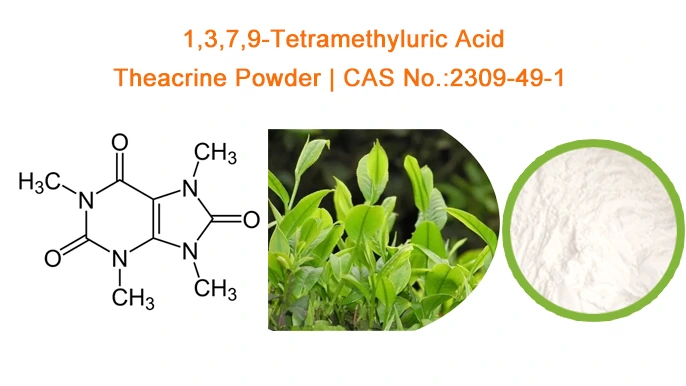
- CAS Number: The CAS (Chemical Abstracts Service) registry number for Theacrine is 2309-49-1.
- Chemical Structure:
- IUPAC Name: 1,3,7,9-Tetramethyluric acid
- Molecular Formula: C9H12N4O3
- Molecular Structure: Theacrine is a purine alkaloid, structurally similar to caffeine but with an additional ketone and methyl group. Its chemical structure includes a purine ring with two amine groups and several methyl substitutions, giving it a unique profile compared to caffeine.
This structure underlies its unique pharmacological effects, including its ability to modulate adenosine and dopamine pathways in the brain, which contributes to its stimulating and mood-enhancing properties.
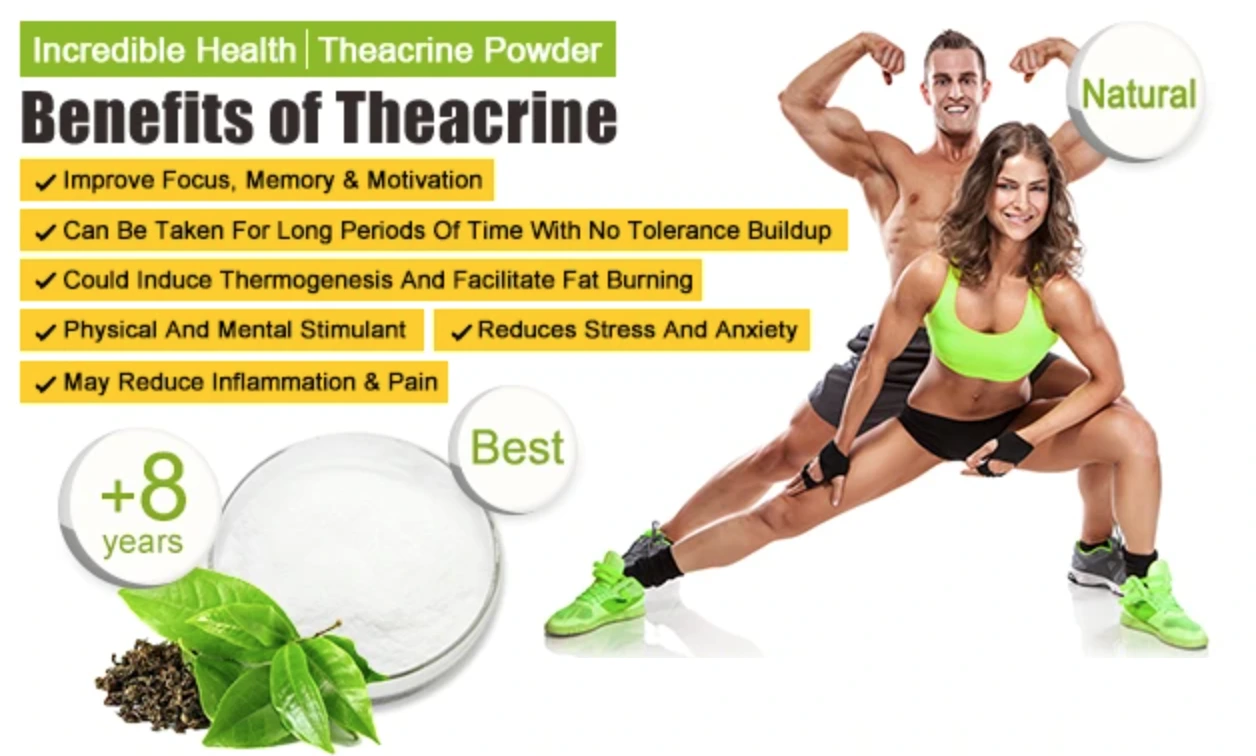
Benefits and Functions of Theacrine
Theacrine offers a range of benefits, primarily due to its unique mechanism of action that affects the central nervous system:
- Enhanced Energy and Focus: Theacrine provides a gradual increase in energy and mental clarity, which lasts longer than caffeine. It’s particularly valued for offering these benefits without the typical crash associated with caffeine consumption.
- Mood Enhancement: Theacrine has been reported to improve mood and motivation, making it useful for enhancing overall well-being and productivity.
- Anti-Fatigue Properties: Theacrine reduces feelings of fatigue, helping users to maintain peak performance for longer periods.
- Cognitive Support: By enhancing neurotransmitter signaling, theacrine may support cognitive functions such as memory, attention, and learning.
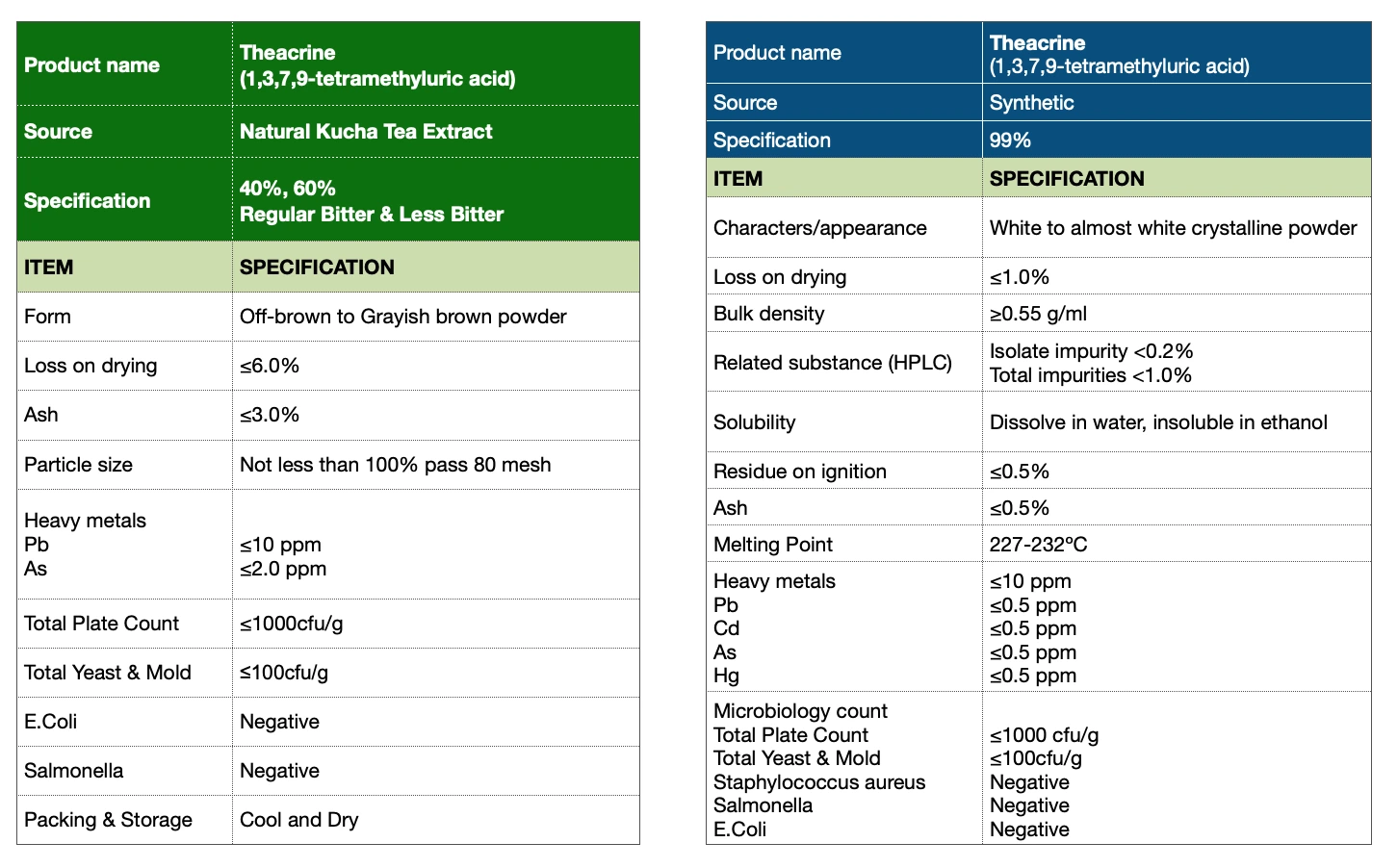
Theacrine Specifications
- Synthetic Theacrine: 99% Purity
- The highest purity form, ideal for precise dosage in supplements and research applications.
- Natural Theacrine from Kucha Tea Extract:
- Purity 40% & 60%: Suitable for general energy-boosting formulations. Available in two variants—regular bitter and less bitter—catering to different taste preferences in consumer products. (Usually regular bitter for dietary supplement, and less bitter for energy drink.)


Applications and Benefits of Theacrine
Theacrine is increasingly being used in various health and wellness products due to its wide range of benefits:

- Increases Energy, Focus, and Motivation:
- Theacrine is popular in sports supplements and pre-workout formulas for providing a sustained energy boost without the negative side effects often associated with caffeine. It enhances focus, concentration, and overall motivation to exercise.
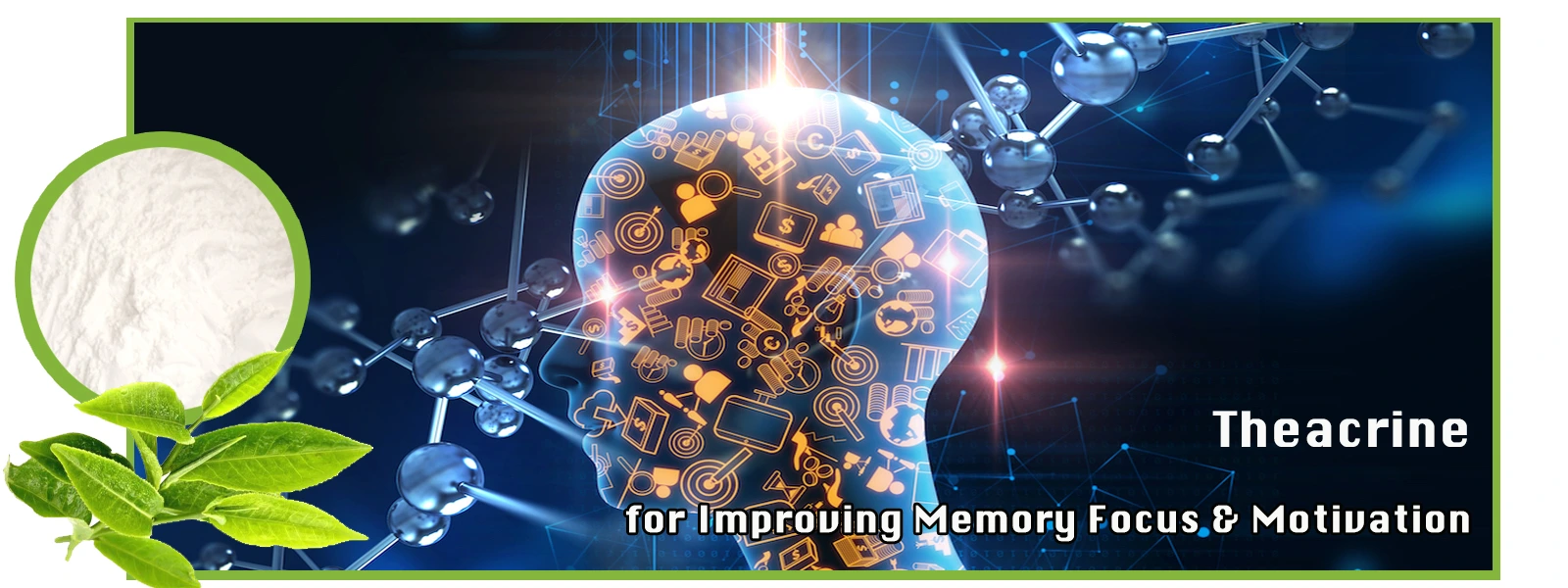
- Improves Mood and May Help with Depression:
- By activating dopamine receptors and increasing dopamine levels, theacrine can enhance mood and reduce symptoms of depression. This makes it a valuable ingredient in mood-enhancing supplements.
- May Improve Sleep:
- In low doses, theacrine has been shown to improve sleep quality by increasing adenosine levels in the brain, counteracting the insomnia effects associated with caffeine.
- Reduces Inflammation and Pain:
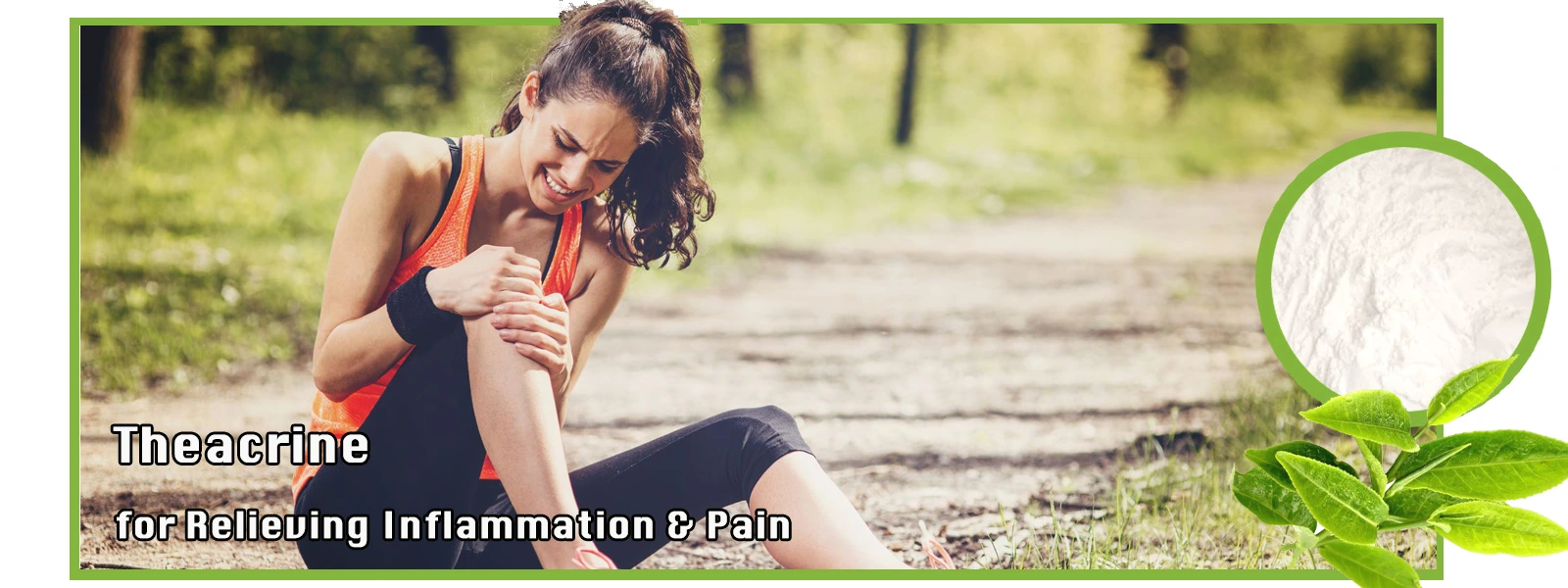
- Theacrine has demonstrated anti-inflammatory and analgesic properties in animal studies, making it a potential ingredient in pain relief formulations.
- Supports Fat Loss:
- Theacrine may induce thermogenesis, helping the body burn fat more efficiently, making it a valuable addition to weight management supplements.
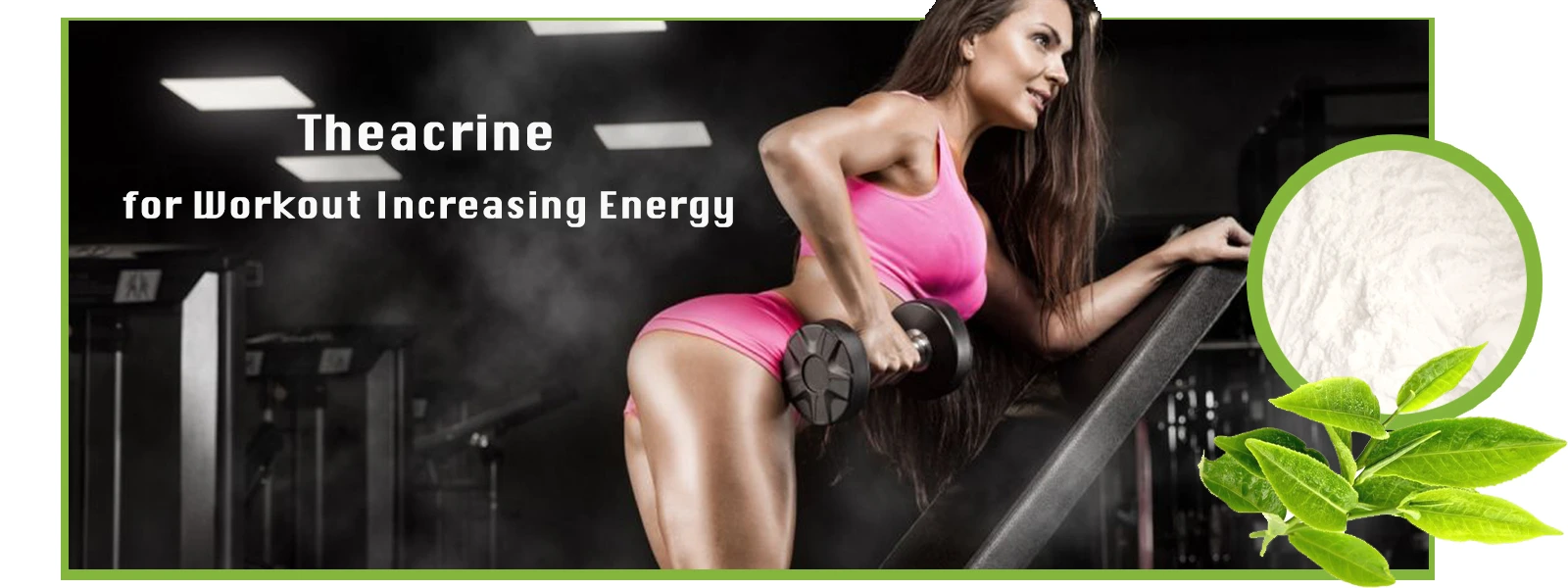
- May Lower Cholesterol:
- High doses of theacrine have been shown to reduce LDL and total cholesterol levels, offering a natural alternative to traditional cholesterol-lowering drugs.

- Cosmetics: Theacrine in cosmetics offers antioxidant, anti-inflammatory, and skin-energizing benefits, enhances collagen, soothes sensitive skin, and boosts the efficacy of other active ingredients.
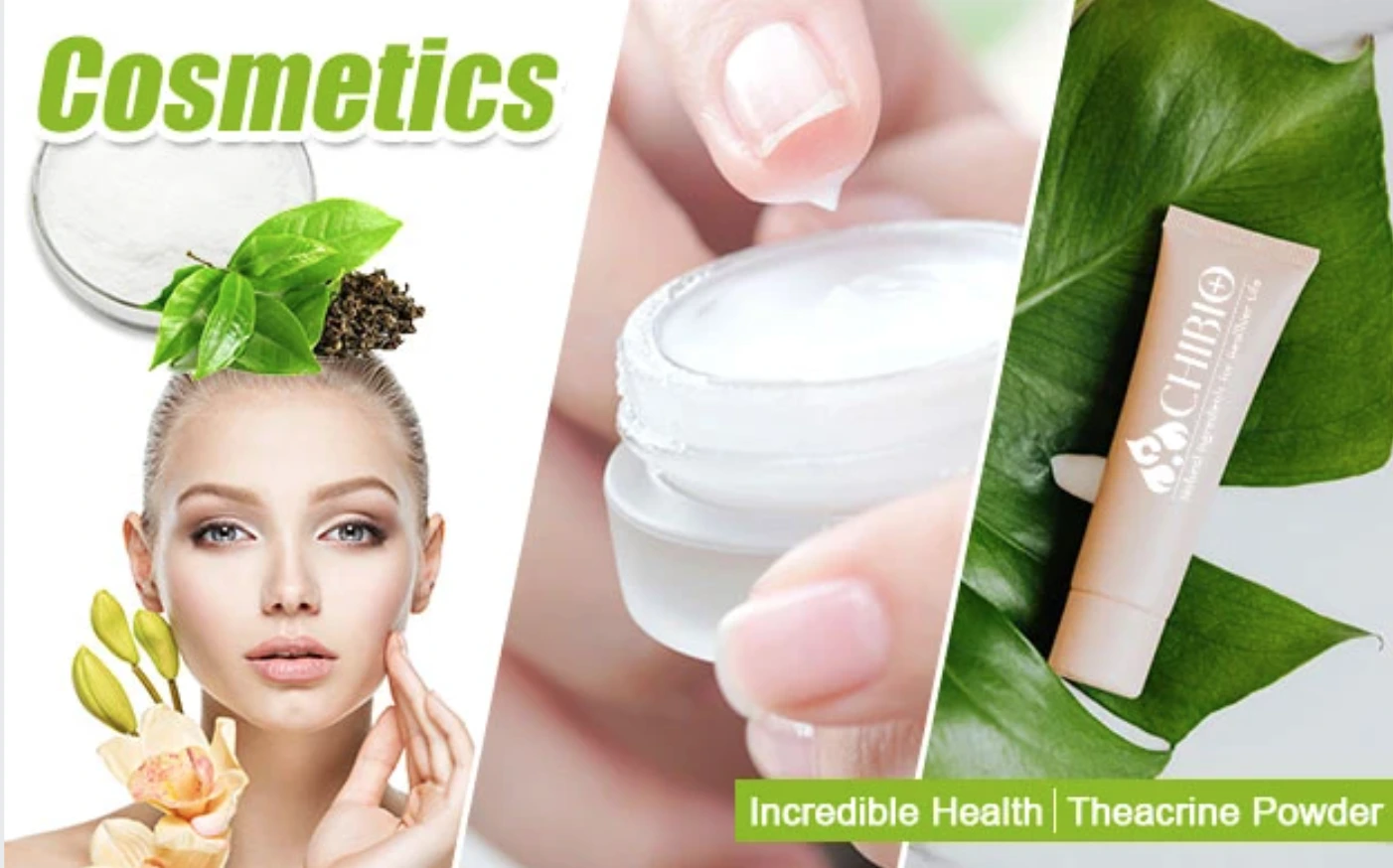
Theacrine Extraction Method
The natural extraction of theacrine primarily involves the kucha plant, which thrives in the wild forests of Yunnan, China, at altitudes above 1,000 meters. The extraction process includes drying the kucha leaves, followed by water extraction, precipitation of tea polyphenols, and further purification using silica gel column chromatography. This method produces natural theacrine with a purity of over 95%.
1. Natural Theacrine Extraction from Kucha Tea
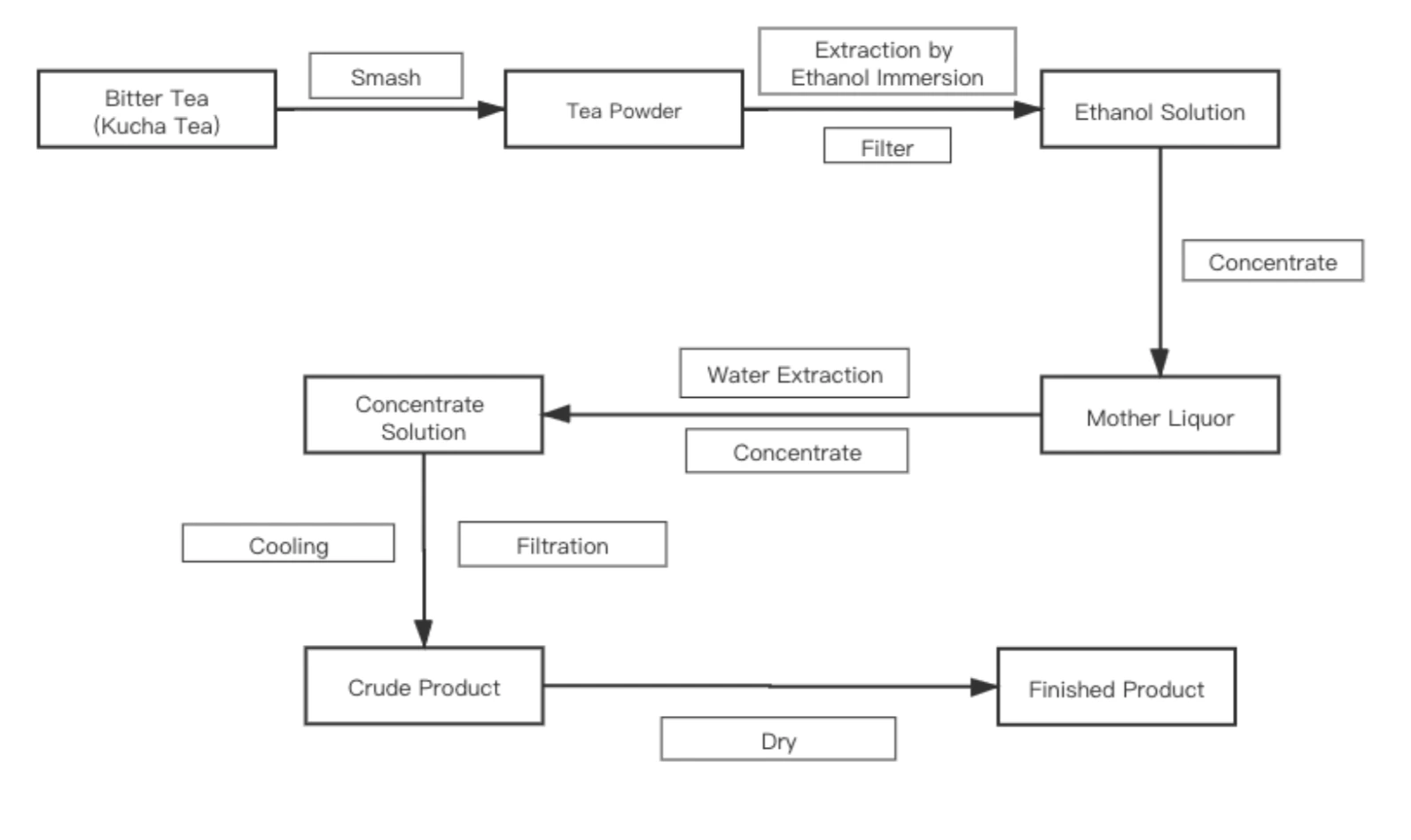
- Bitter Tea (Kucha Tea)
- The process starts with raw Kucha tea leaves.
- Smash
- The tea leaves are smashed into a fine powder to increase the surface area for extraction.
- Extraction by Ethanol Immersion
- The tea powder undergoes ethanol immersion, extracting the active compounds, including theacrine.
- Filter
- The ethanol solution is filtered to remove any solid residues.
- Concentration
- The ethanol solution is then concentrated to increase the purity of the active compounds.
- Mother Liquor
- The concentrated ethanol solution is further processed to obtain the mother liquor, which contains theacrine and other compounds.
- Water Extraction
- The mother liquor is subjected to water extraction to separate the theacrine.
- Concentrate
- The solution is concentrated again to purify the theacrine further.
- Concentrate Solution
- The concentrated solution is filtered and cooled to form the crude theacrine product.
- Filtration and Cooling
- The crude product is filtered and cooled to remove impurities.
- Drying
- The filtered solution is dried to obtain the final theacrine product in a solid form.
- Finished Product
- The final product is pure, natural theacrine, ready for packaging and distribution.
2. Synthetic Theacrine Production
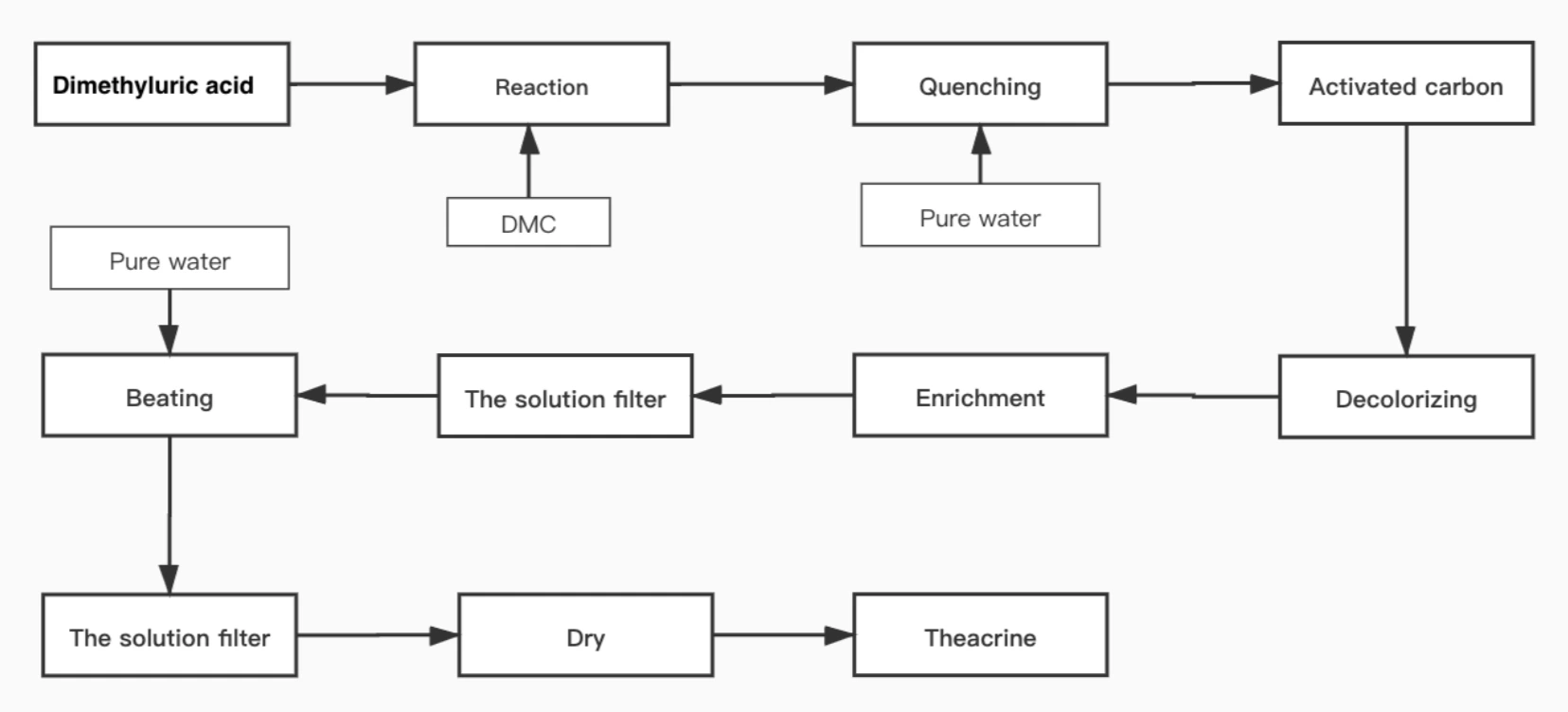
- Dimethyluric Acid
- The synthesis starts with dimethyluric acid as the primary chemical precursor.
- Reaction
- Dimethyluric acid undergoes a chemical reaction, often involving DMC (dimethyl carbonate) to modify its structure.
- Quenching
- The reaction is quenched with pure water to stop the chemical reaction and stabilize the compound.
- Activated Carbon
- Activated carbon is used in the decolorizing process to remove impurities and unwanted coloration from the solution.
- Decolorizing
- The solution is decolorized to achieve a purer theacrine product.
- Enrichment
- The solution is then enriched to increase the concentration of theacrine.
- Beating
- The enriched solution is beaten to further refine the product, improving its purity and consistency.
- The Solution Filter
- The solution is filtered to remove any remaining solid impurities.
- Drying
- The filtered solution is dried to form the final synthetic theacrine product.
- Finished Product
- The finished product is high-purity synthetic theacrine, ready for industrial or commercial use.
How Does Theacrine Work?
Theacrine works by modulating the adenosine and dopamine systems in the brain. It inhibits adenosine, a neurotransmitter associated with relaxation and sleep, thereby promoting wakefulness and alertness. Simultaneously, it enhances dopamine signaling, which improves mood, motivation, and focus. Unlike caffeine, theacrine does not lead to a significant increase in blood pressure or heart rate, making it a safer alternative for long-term use.
Theacrine operates through mechanisms similar to caffeine but with distinct advantages. Chemically, theacrine differs from caffeine by having an additional methyl group and a ketone group. These subtle changes result in a compound with a longer half-life, reduced tolerance, and fewer side effects.
Theacrine works by modulating two primary neurotransmitter systems:
- Adenosinergic Neurotransmission: Like caffeine, theacrine alters adenosine signaling, promoting wakefulness and reducing feelings of fatigue.
- Dopaminergic Neurotransmission: Theacrine acts as a dopamine agonist, enhancing mood, motivation, and overall cognitive function by increasing dopamine levels in the brain.
These combined actions make theacrine an effective stimulant for boosting both physical and mental energy without the common drawbacks associated with caffeine.
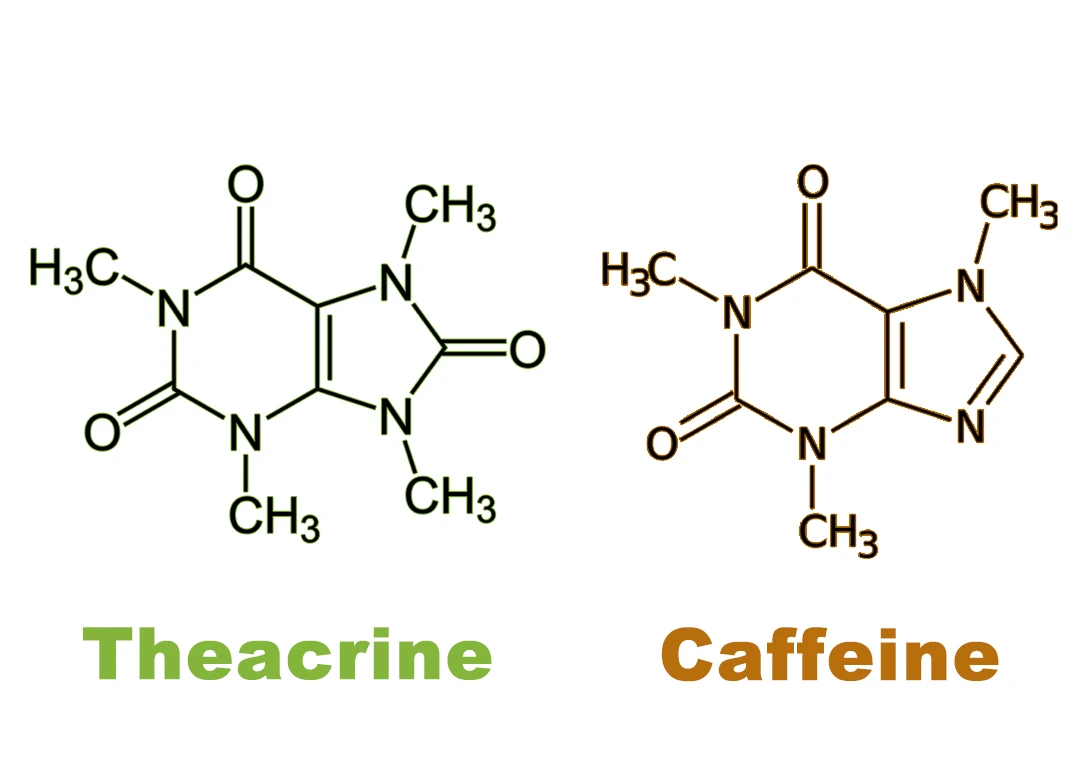
Theacrine vs. Caffeine
While both theacrine and caffeine are stimulants, theacrine offers several unique benefits:
- Longer Half-Life: Theacrine provides sustained energy over a longer period, reducing the need for frequent dosing.
- No Tolerance Build-Up: Unlike caffeine, users do not quickly develop a tolerance to theacrine, allowing for consistent effects over time.
- Fewer Side Effects: Theacrine is less likely to cause jitters, anxiety, or insomnia, making it a gentler alternative for those sensitive to caffeine.
- No Impact on Blood Pressure: Theacrine does not significantly affect blood pressure, making it a safer option for individuals with cardiovascular concerns.
- Energy and Focus: While both theacrine and caffeine boost energy and focus, theacrine provides a more gradual and sustained effect, avoiding the sharp peaks and crashes often associated with caffeine.
Interestingly, theacrine and caffeine are more effective when taken together. Caffeine increases the bioavailability of theacrine, enhancing its positive effects while still mitigating the negative aspects of caffeine.

Dosage, Safety, Limitations & Reviews
- Dosage: Theacrine exhibits biphasic effects—low doses (below 50mg) tend to have sedative properties, while higher doses (up to 300mg per day) are stimulating. The recommended dosage typically ranges between 50 to 300mg daily, depending on the desired effect.
- The recommended dosage of theacrine varies based on its form. For synthetic theacrine (99% purity), a typical dose ranges from 50-150 mg per day. For natural theacrine (40-60% purity), higher doses are required to achieve the same effect, typically between 100-300 mg per day.
- Safety: Theacrine is generally considered safe for daily use, with no significant side effects reported in clinical studies. It does not cause tolerance build-up, even with long-term use. However, more research is needed to confirm its safety during pregnancy and breastfeeding.
- Limitations: As a relatively new compound, theacrine has limited scientific studies compared to caffeine. It is often formulated as part of multi-ingredient supplements, making it difficult to isolate its specific effects.
- Reviews: Users frequently praise theacrine for its ability to provide sustained energy without the crash, as well as its mood-enhancing properties. Many prefer it over caffeine for these reasons.

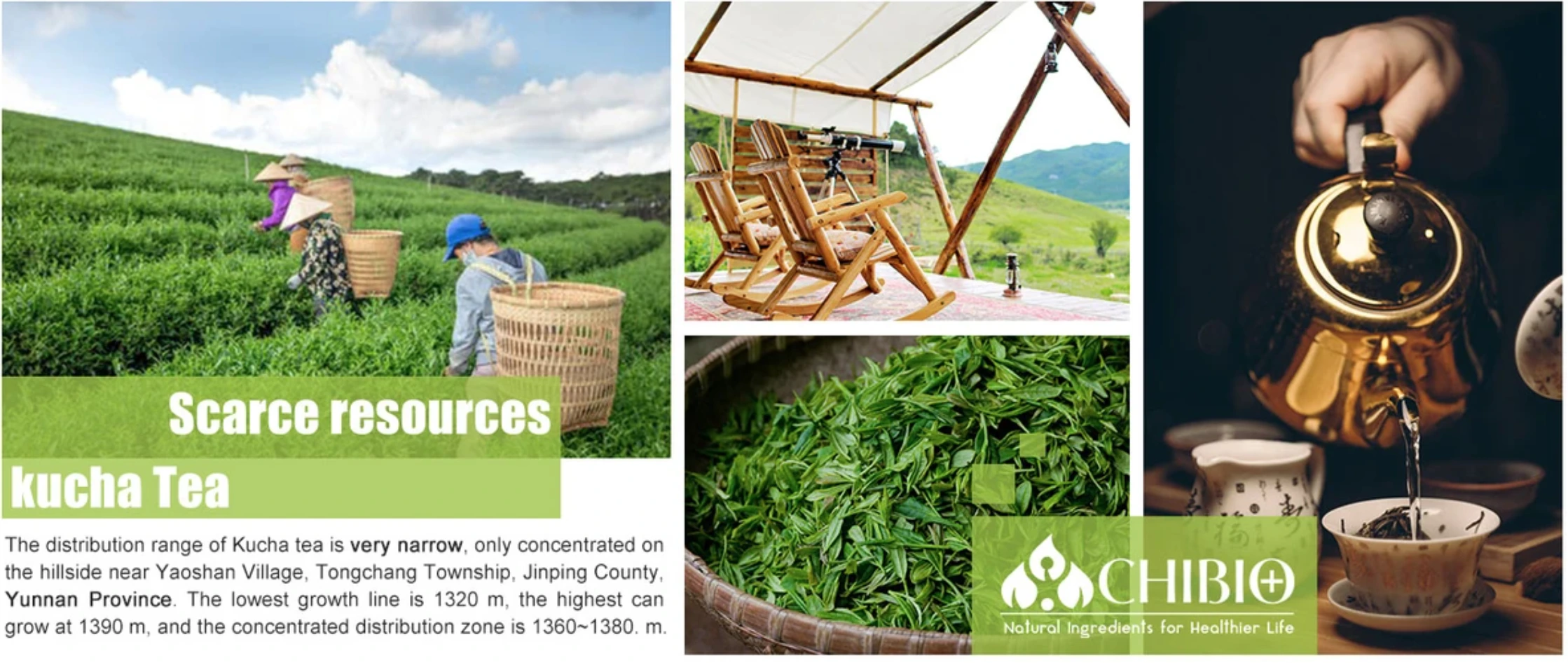
Why Choose Chibio Biotech?
Chibio Biotech is a leader in the production and supply of high-quality theacrine, sourced both naturally from kucha tea and synthesized for purity. Here’s why you should choose Chibio Biotech:
- Certified Quality: All our theacrine products are manufactured under stringent quality control standards and come with international certifications, ensuring consistency and safety.
- Customization Options: We offer a variety of theacrine specifications, including different purity levels and taste variants, to meet your specific needs.
- Global Reach: With over a decade of experience in exporting to 50+ countries, Chibio Biotech is a trusted partner for businesses worldwide.
Why Use Theacrine in Your Business?
Incorporating theacrine into your product lineup can give you a competitive edge. Whether you are developing supplements, energy drinks, or cognitive enhancers, theacrine’s unique properties—long-lasting energy, reduced side effects, and minimal tolerance—make it an ideal choice. As consumer demand for effective and safer alternatives to caffeine grows, theacrine presents a compelling opportunity for businesses to innovate and lead in the market.
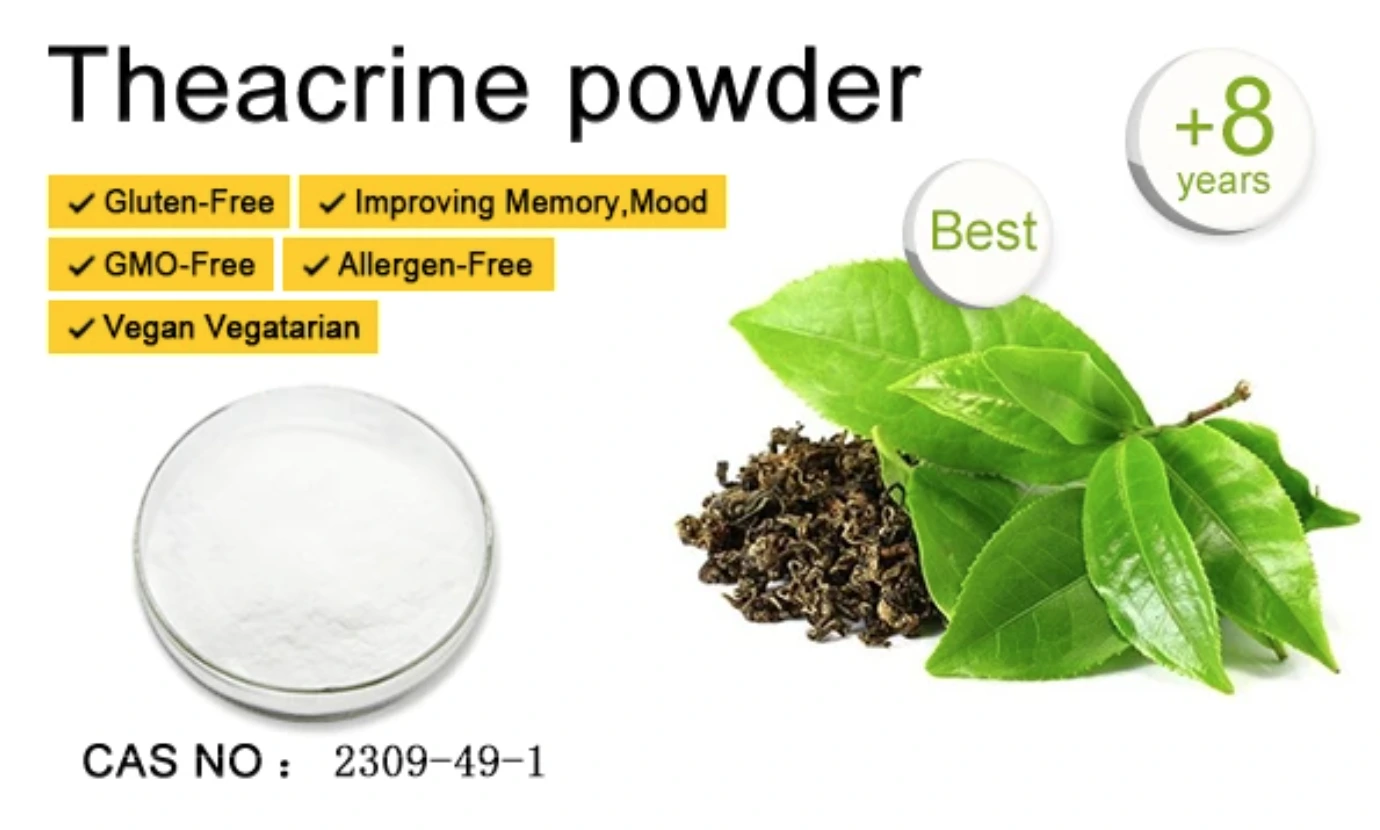
By choosing Chibio Biotech, you gain access to top-tier theacrine products and a reliable partner committed to your success.
Get in touch with us to boost your business

- Get Free Sample
- Get Step Quote
- 24/7 Service
- Customized Specification
- Confidentiality Agreement
Headquarter
Block B, Vanke Center, No.2 Heilongjiang South Road, Shibei District, Qingdao City, China 266033
Phone
+86 (0)532 66983270
Cellphone / WhatsApp / WeChat
+86 156 6577 2296
+86 133 8100 5417




